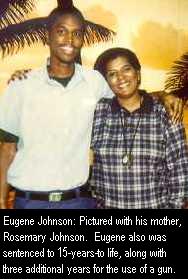| Professions
of innocence, conflicting witness statements, witnesses never called, evidence
kits missing, inept or corrupt police officers, collusion by prosecutors
- sounds like a made-for-TV movie? Wrong. These are all allegations
made in the Feb. 10, 1995 shooting death of Clifton Hudson, 19, of Elyria.
Charged, convicted and serving 15 years-to-life for his murder are Laurese Glover, then 17 now 21, Eugene Johnson, then 18 now 22, and Derrick Wheatt, then 17 now 21. Johnson and Wheatt were given an additional three-year term because a gun was involved. All three defendants now reside in Madison Correctional Institute and continue to profess their innocence. Leading the fight for
justice
At the heart of Watson's argument are witnesses who were never called to testify, the inconsistent testimony of the state's sole witness and an overall rush to judgment by East Cleveland police officers. Watson said that after a protest on behalf of the three men was held by Black on Black 2000 several witnesses came forward and offered testimony which disputes the facts entered into evidence. Furthermore, Watson said that his investigation has led him to the actual shooter, information which has been passed on to the East Cleveland police department. The parents of Glover, Johnson and Wheatt each have stated that on different occasions, they and/or their sons were told by Detective Vincent Johnstone and Detective Michael Perry that they knew "the boys didn't do it," but that "somebody had to go down for it [the murder]" Statements such as these lead to questions of police misconduct, and ineptness. Watson would only say that there have been many mistakes made, and that from his knowledge of police departments, "they [East Cleveland] have not been considered to be the premiere force in the state of Ohio." Yet, speaking on behalf of the city, Watson said that Mayor Emmanuel Onunwor "was willing to cooperate to find out whether or not they made a mistake," but before the Mayor's office could facilitate this agreement, a special order came from the County Prosecutor's office stating that all information gathered in the investigation was "to be secreted and held in the care and custody of the county." This action baffled Watson who said, "You have convicted somebody, you sent them to jail. The appeal is dead. Then why can't I look at the file," or at least that the decision should be that of the city of East Cleveland. He questions, "Where is the idea of justice. There is supposed to be a search for the truth." A response from the Prosecutor's office was not available at presstime. The Shooting
Glover was driving as Wheatt sat in the passenger's seat and Johnson rode in the backseat. After picking up a few friends and dropping them off, the teens were headed back to Glover's house when, according to their statements and that of family members, friends and witnesses, they heard gun shots, and then they saw a man lying on the ground at 1706 Strathmore and another man running from the scene. After witnessing this, they continued on their way - not thinking much of it, shootings were somewhat common place in the neighborhood. This sense of nanchalance has proven to be the biggest mistake these young men have made in their short lives. Shortly after the shooting, East Cleveland police officers arrived on the scene. At the sceneof the shooting was the state's lone witness, Tamika Harris, 14, as well as Starley Johnson, 11, Stephen Johnson, 10, Jaquana Johnson, Reginald Longino and Kim Johnson, who were never called to testify. What the witnesses saw
Lee Malone said that he heard gunshots on the evening of the shooting, just as he was returning home from work. He lives on Ardenall which is about one street over from Strathmore where the shooting occurred, but his house is near the corner of Manhattan. As he parked his car on the corner he witnessed a black Blazer coming down Manhattan, with a man running behind the Blazer. He says that the man running behind the Blazer put something in his pants and then ran up the hill over the railroad tracks. "At no time did anyone get in the Blazer," Malone said. He further stated that the man running could not have been one of the accused because he was older, maybe in his late 20's or early 30's. The shooter also "wore his pants on his waist," said Malone, which he said was not the habit of any of the three accused. Thugs or Angels
©1999
Cleveland Life
|


